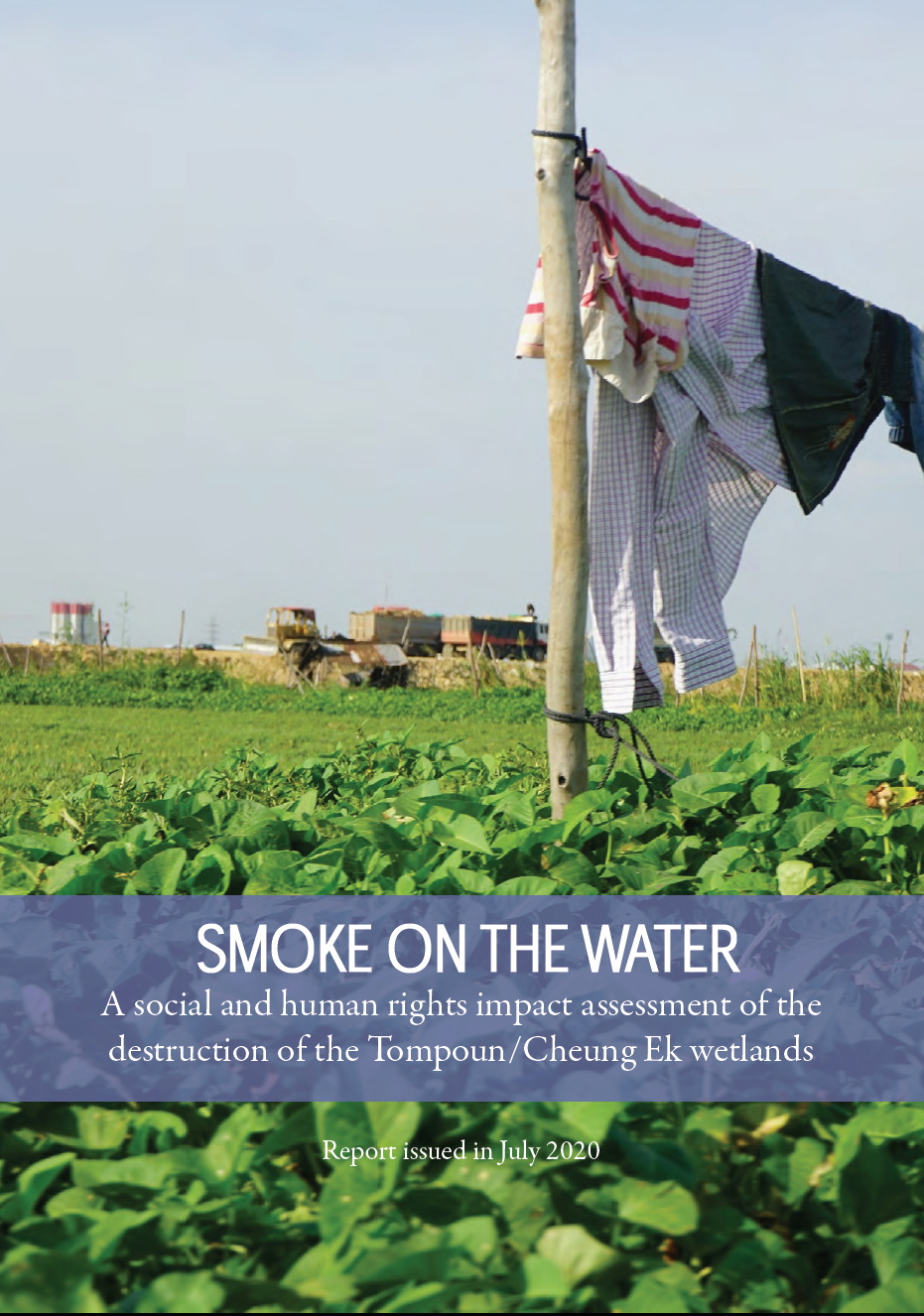
Smoke on the Water
Publication Year: 2020 / Sources: United Nations High Commissioner for Human Rights.Since 2004, the ING City project has been progressively destroying the Tompoun/Cheung Ek wetlands in Phnom Penh, threatening the livelihoods and homes of more than a thousand families, devastating the wetlands ecosystem, placing more than a million people at increased risk of flooding, worsening food insecurity, and polluting the Mekong and Bassac rivers with untreated sewage and harmful pollutants. The wetlands are a vital flood protection area for Phnom Penh, as well as the city’s only wastewater treatment system. ING City, and other proponents, are currently infilling the wetlands with sand and dirt to create land for real estate.
Download: English | Khmer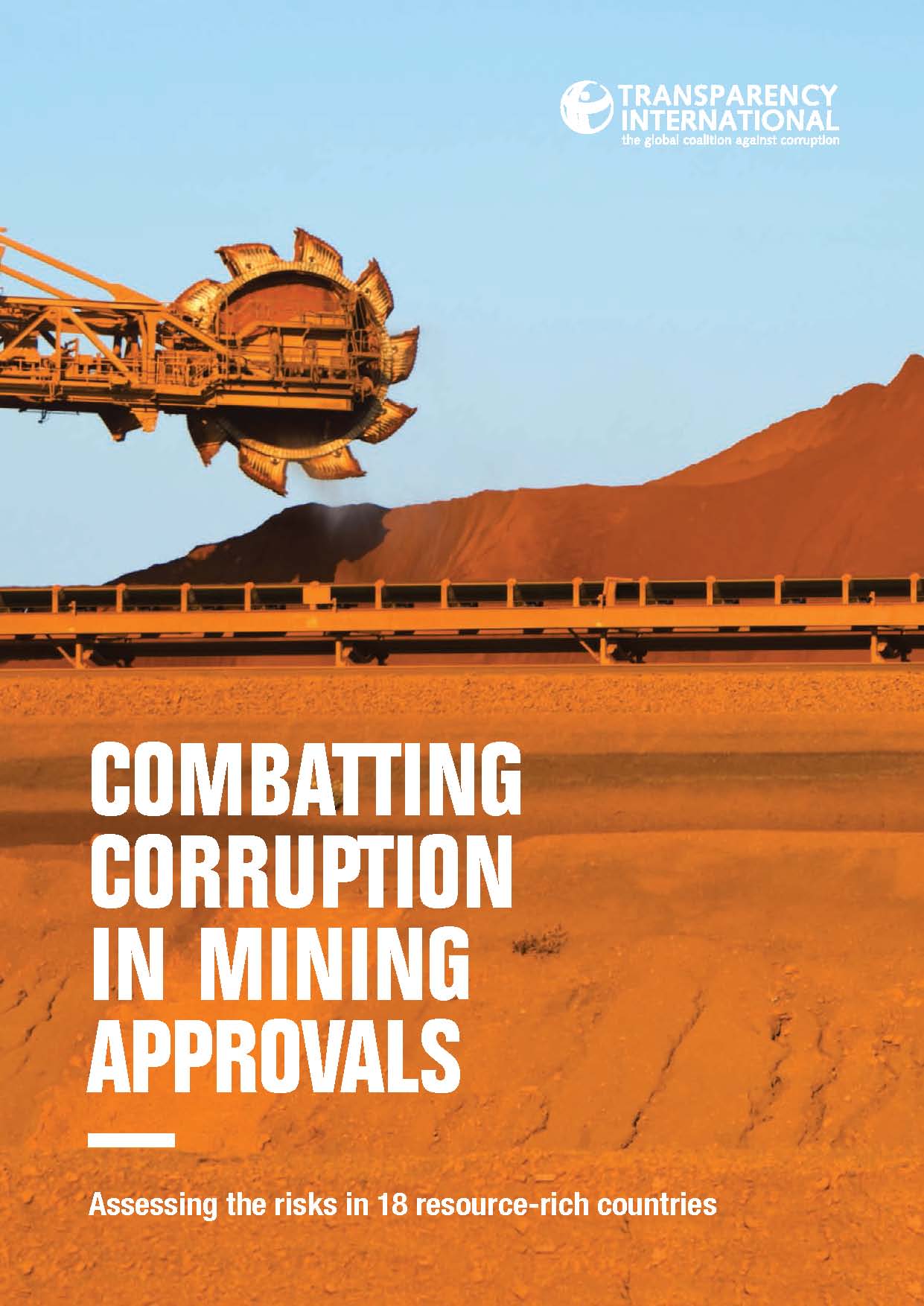
Combatting Corruption in Mining Approvals
Publication Year: 2017 / Sources: Transparency InternationalCombatting Corruption in Mining Approvals (Assessing the risks in 18 resource-rich countries)
Transparency International has assessed the risks that can lead to corruption in 18 resource-rich countries to identify the warning signals as early as possible. This report demonstrates where and how corruption can get a foothold in mining approvals processes before ground is even broken. It presents examples from a range of diverse countries and identifies important roles for government, the mining industry and civil society to identify, prevent and mitigate these risks.
Download: English | Khmer
Full Report: Cambodia’s Mineral Exploration Licensing Process: Governance Risk Assessment
Publication Year: 2017 / Sources: Transparency International CambodiaThis Governance Risk Assessment was conducted as part of Transparency International’s Mining for Sustainable Development (M4SD) Programme. The aim of this study is to identify the systemic, regulatory and institutional vulnerabilities to malpractice in awarding mining and mining-related licences, permits and contracts. The study will also assess the specific governance risks created by these vulnerabilities and present recommendations. This report presents the main findings from the research and the results of the risk assessment.
Download: English | Khmer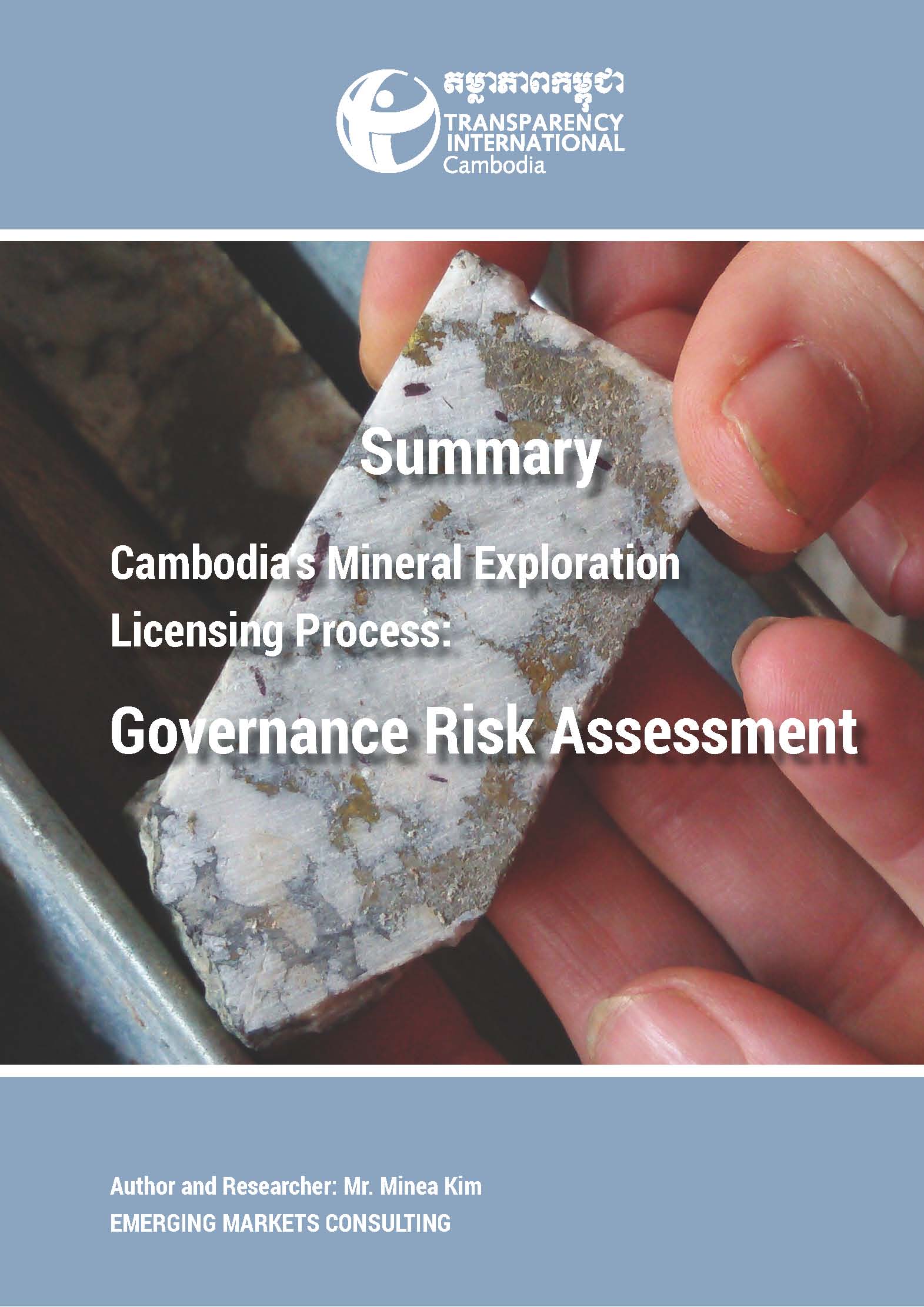
Summary: Cambodia’s Mineral Exploration Licensing Process: Governance Risk Assessment
Publication Year: 2017 / Sources: Transparency International CambodiaThis Governance Risk Assessment was conducted as part of Transparency International’s Mining for Sustainable Development (M4SD) Programme. The aim of this study is to identify the systemic, regulatory and institutional vulnerabilities to malpractice in awarding mining and mining-related licences, permits and contracts. The study will also assess the specific governance risks created by these vulnerabilities and present recommendations. This report presents the main findings from the research and the results of the risk assessment.
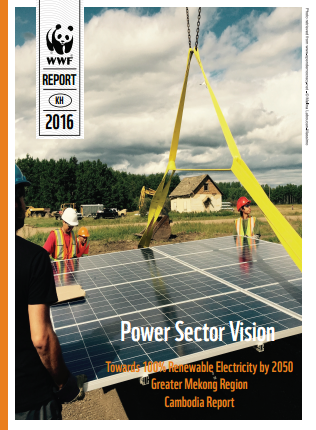
Cambodia Renewable Energy Report 2016
Publication Year: 2016 / Sources: WWF-CambodiaCambodia has an opportunity to become a leader in clean, renewable electricity as renewable energy sources such as sun, wind, water and biomass energy abound. This report demonstrates that Cambodia can, with appropriate international support, deliver on these plans in the short term and build on them to achieve even more sustainable outcomes.
Download: English | Khmer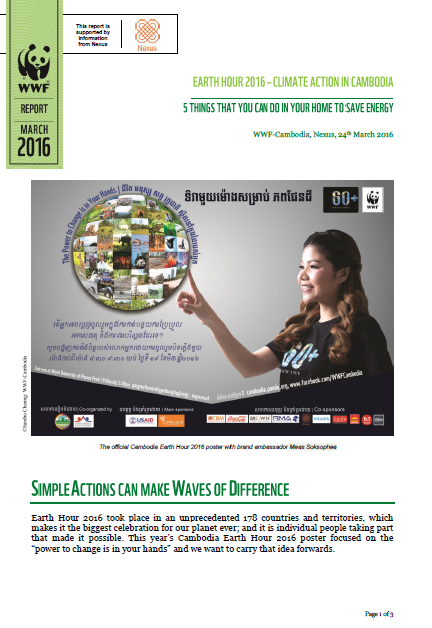
Earth Hour 2016- Climate Action in Cambodia: 5 Things that You Can Do in Your Home to Save Energy
Publication Year: 2016 / Sources: WWF-CambodiaEarth Hour is not just making a difference for one hour, it is about channeling that passion and taking it forward into everyday life. Below are some ideas about how you can continue to help in the fight against climate change and make a difference every day.
Download: English | Khmer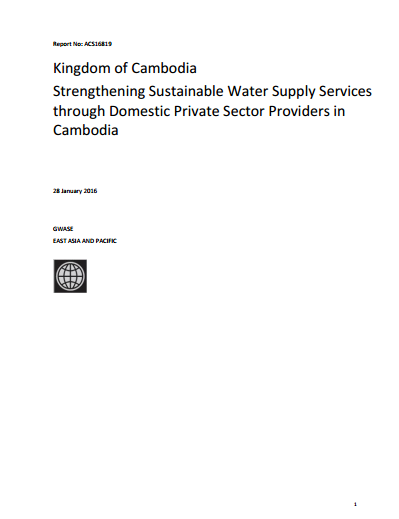
Strengthening Sustainable Water Supply Services through Domestic Private Sector Providers in Cambodia
Publication Year: 2016 / Sources: World BankCambodia has the lowest access to piped water supply in the South East Asia region, which was estimated to be 21% by 2015. Out of Cambodia’s estimated population of 15.6 million, access to piped services was only 7% for rural areas, where four-fifth of the population is living, and much higher at 75% for Cambodia’s urban areas.
Download: English | Khmer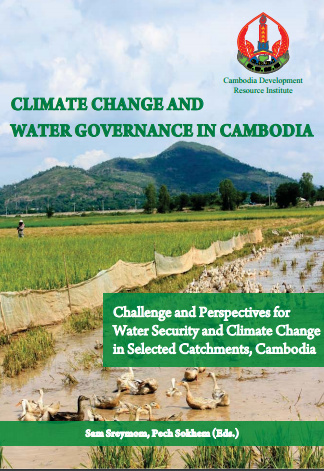
Climate Change and Water Governance in Cambodia
Publication Year: 2015 / Sources: Cambodia Development Resource Institute (CDRI)Cambodia has abundant water resources but they are spatially and temporally unevenly distributed. In reality, many communities face problems brought on by too much or too little water. This situation is compounded by the effects of catchment degradation caused by physical alteration of inland water systems, deforestation and habitat destruction and water withdrawal for agriculture…etc.
Download: English | Khmer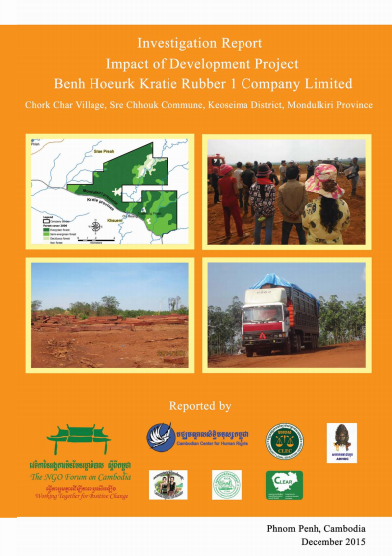
Investigation Report on Impacts of the Developmemnt Project of Benh Hoeurk Kratie Rubber 1 Company Limited in Sre Chhouk commune, Keo Seima district, Mondulkiri province
Publication Year: 2015 / Sources: NGO Forum on Cambodia, Cambodian Center for Human Right, and Indigenous Peoples And Forestry NetworkAccording to investigation results, there are 05 main issues, i.e., indigenous residents’ tenure rights to their shifting plantations, effects on legal land rights of individuals or a legal entity, the process of granting the economic land concession, destruction of resin trees and logging outside the ELC area, and intimidation of indigenous communities’ representatives through court.
Download: English | Khmer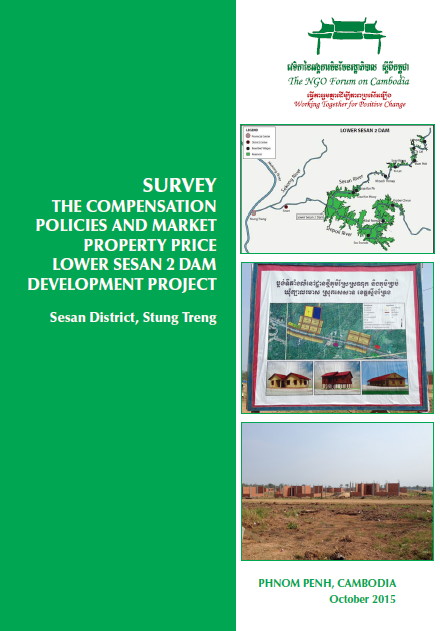
Survey on the Compensation Policies and Market Property Price, LSS2 Dam Development Project
Publication Year: 2015 / Sources: NGO Forum on CambodiaThe Lower Sesan 2 dam (LSS2) in Stung Treng Province is currently under construction, and is projected to cause the most severe environmental impact of any dam planned for a tributary of the Mekong River. The main objective of research is to review relevant and contradicting laws and policies and estimate just and fair compensation for the communities affected by the LSS2 .
Download: English | Khmer